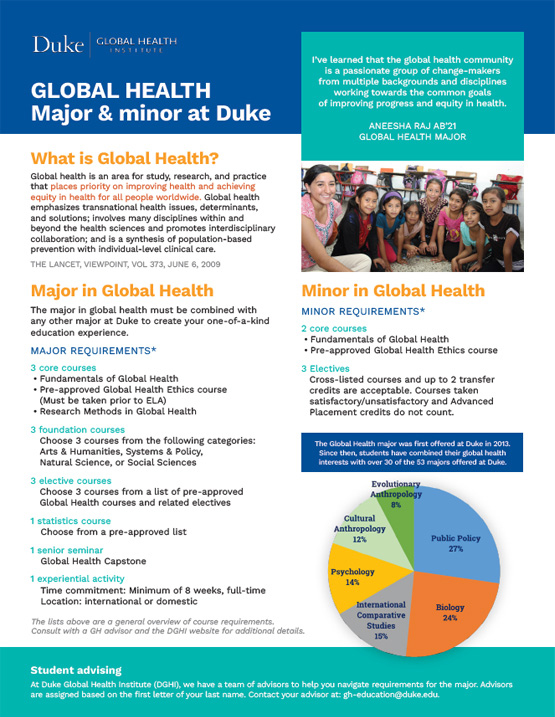
If you’re a Duke undergraduate, studying global health can provide a multidisciplinary lens on the complex challenges of our interconnected world. Along with the knowledge gained through global health coursework, you’ll have opportunities to participate in research, service and field experiences.
We offer a global health co-major, which is paired with another major, as well as a global health minor. Both programs emphasize the ethically informed study of health disparities experienced by people around the world. You’ll learn to study social determinants of health and the complex relationship between health and environmental, social and cultural factors. Students explore these relationships through coursework, study abroad programs, fieldwork experiences and interactions within the global health community.
For select, highly qualified Duke undergraduate students, we also offer an accelerated MS-GH program, which allows students to complete a Master of Science in Global Health degree with only one additional year of study. Students apply during their junior year and begin graduate coursework during their senior year.
Program Features
A Broad Range of Options
The interdisciplinary nature of global health makes it easy for students to add a global health co-major or minor to their degree paths. Many global health courses are cross-listed in other departments, and courses frequently explore the intersections of health and other disciplines, including the natural and social sciences, public policy, engineering and the environment. In fact, students have combined the global health co-major with more than 40 different majors.
Experiential Learning and Field-Based Research
As a global health major, you will complete an experiential learning requirement before spring semester of your senior year. Experiential learning allows you to apply skills learned in the classroom through hands-on experience. You will gain an understanding of the opportunities and difficulties inherent in implementing health interventions and engage with communities and colleagues.
Go Deeper with Global Health
We encourage global health students to take advantage of the many opportunities at Duke to deepen engagement in your education, your community and the wider world. Your global health advisor can help you explore options such as graduation with distinction, independent study and study away. Schedule a meeting with an advisor to learn more.
Students can also delve deeper in a topic by getting involved in research. DGHI faculty, students and partners are engaged in research projects in more than 40 countries. Many faculty are able to involve students in their research projects, and some DGHI research centers also hire students as interns. Reach out to faculty who are doing research in areas that interest you to see what opportunities they may have to offer.
Requirements
Global Health Co-Major
- Fundamentals of Global Health
- Ethics
- Research Methods
- Statistics
- 3 Foundation Courses
- 3 Electives
- Experiential Learning Activity
- Global Health Capstone
Global Health Minor
- Fundamentals of Global Health
- Ethics
- 3 Electives
Take the Next Step
Ready to add global health to your studies? Meet with an advisor to understand your curriculum options.
Questions?
The DGHI advising team is here to help. Your advisor is assigned based on the first letter of your last name. You can contact them directly or use the online booking calendar to make an appointment.
- A-G: Maegan Hoss | maegan.hoss@duke.edu
- H-Z: Emilee Kerr | emilee.kerr@duke.edu

Emilee Kerr
Student Services Coordinator

Maegan Hoss
Student Services Coordinator